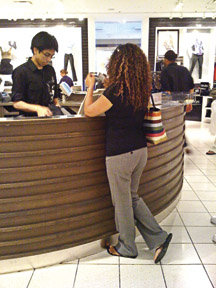Jashon Smith and Nicholas Magu had a tough time recently as they zigzagged through Jersey City’s Newport Centre Mall looking for jobs.
“It’s not going as well as I planned,” said Smith, 17, of Jersey City. He said he had approached retail stores in Newark as well. “I thought things would go well, seeing that it’s summer and [managers] would need positions filled. But it’s not really going in our favor.”
Many teens throughout the county recently said that the pickings are slim.
“A lot of managers, they’re not really looking to hire you if you’re 16.” – Bimar Amaro
________
After a week and a half on the job hunt, Smith and Magu, who is 16, said they haven’t given up hope of finding something. But they recognize that as teens looking for jobs in a still struggling economy, they have a challenging task ahead of them.
Worst in decades
Millions of young job seekers are having trouble finding employment.
According to the U.S. Department of Labor, 2010 will be the worst year for young workers since 1947. The department defines “young” workers as those between the ages of 16 and 24.
According to a congressional report released in May, youth unemployment reached historic heights in April 2010, even as 570,000 new jobs were added to the economy. The report, “Understanding the Economy: Unemployment Among Young Workers,” found that youth unemployment was 19.6 percent in April.
And according to conclusions in the report, the younger the worker, the worse the job prospects; for workers aged 16 and 17, the unemployment rate jumped to 29 percent.
Helping Mom with the rent
“A lot of managers, they’re not really looking to hire you if you’re 16 because they figure you’re not serious,” said Bimar Amaro, 19, a Union City resident who works at the pretzel shop Auntie Anne’s in Newport Mall. Amaro said he landed the job after a friend who works for the company recommended him for the position.
“I wanted to get a job to help my mom with the rent,” he added. “I got lucky. My friend helped me with this. But I got a lot of friends that say it’s hard to find a job right now.”
Younger workers typically find it more difficult to find employment due to a lack of experience, less education, conflicts with school schedules, and a perception among employers that they lack maturity.
Same story in Secaucus
A number of store managers at Newport Mall and at Mill Creek Mall in Secaucus declined to be interviewed for attribution. However, most reported that they had no openings.
The managers of three stores that had vacant positions all said they had applications from “experienced” adults, making it less likely they’d hire a younger less experienced worker.
Unique challenges
Elected leaders in Washington are examining the unique challenges faced by younger workers because, according to congressional testimony, prolonged unemployment – even as a young worker – can have a long-term impact on earning potential.
In testimony given before the U.S. Congress Joint Economic Committee, which released “Understanding the Economy: Unemployment Among Young Workers,” one researcher stated that young employees who enter the job market during a recession earn considerably less over their lifetimes than those who enter the market during better economic times.
Even those with advanced education are not spared.
When the recession began, many young people who could not find work returned to school, often taking out loans to further their education. These students are now graduating with student loan debts but are still unable to find work.
Student loan default rates also rose during the recession. Outstanding loans have increased by 50 percent since 2007, when the recession began.
Congress is now considering legislation to help younger workers benefit as the economy improves.
“That’s good, ’cause it’s been hard,” said Jersey City resident Chris Wright, 15, who has been job hunting for a month. “A lot of things I applied for, I never got a call back.”
E-mail E. Assata Wright at awright@hudsonreporter.com.
